
When you think of sports video games you might think of Fifa or Madden, which obsessively mimic their real-life equivalents – or Track & Field, which valiantly if unsuccessfully tries to. But not all developers play by the rules. From impossible athletics to fantasy baseball players with 27 fingers, these are some of the weirdest virtual takes on sport around.
QWOP (Bennett Foddy, 2008)

Bennett Foddy loves the Olympics, especially the 50km race walk “for its heartbreaking reversals in fortune”. He has also always loved physics-based video games, like the arcade game Gravitar (1982) and Ski Stunt Simulator (2001). So it was natural that he would want to make an athletics game with proper dynamic physics. “What I didn’t realise at the time,” he says, “is that this is actually an incredibly hard robotics problem, and I was an extremely incompetent self-taught coder.”
Foddy took the batsman from his earlier cricket game Little Master Cricket, chucked the bat, and connected his thighs and calves to the Q, W, O, and P keys. The result was the unintentionally hilarious QWOP (2008), in which you clumsily control the sole athletics representative of a small nation with an underfunded training programme, flailing down the track like a ragdoll. Even making it past the starting line is an achievement here.

Behold the Kickmen (Size Five Games, 2017)
Dan Marshall has an “actual deep-seated hatred” of football, thanks to its prominence in the news alongside war and the climate crisis, the “extortionate” salaries of players, and its general unavoidable ubiquity. But one day, when his newborn son had left him too sleep-deprived to focus on bigger tasks (like working on his latest game Lair of the Clockwork God, out now on Switch), he thought it would be funny if he made a football game anyway. So he tweeted about it. “And it went like wildfire,” Marshall says. “As a game developer, you can’t buy that sort of publicity.”
The joke became a game, complete with comical story mode, its design influenced by the flippant Twitter personality Marshall adopted when politely informing “actual livid football fans” that it was an umpire, not a referee, who would give you a little kiss when you scored a goal. The pitch is round and striped, and you start in the Premier League, “which makes sense. Premier means first.”
Regular Human Basketball (Powerhoof, 2018)

In Regular Human Basketball, players cooperate to control a giant robot from the inside. Developer Dave Lloyd says: “I thought, what’s simpler than picking up a ball and putting it in a net?” Co-creators Barney Cumming and Louis Meyer, basketball fans themselves, agreed, and Meyer injected his knowledge of the sport into a commentary about machines of the future reinterpreting this ancient game.
Using a real sport meant the designers didn’t have to teach the player what to do, especially since more complex basketball rules were left out for the sake of simplicity. “[It] reinforced to us how powerful real-world sport can be as a tool to give players a clear objective,” says Lloyd. “But the main lesson was that, like real-world sport, it’s the interaction going on between the people as they play that generates most of the fun.”
The developers also made a free game that’s closer to actual basketball, “but with a lot more kicking people”, based on the “natural shooting motion” of NBA player Draymond Green. “It got more attention than we bargained for,” Lloyd says. “And reps from Golden State Warriors, uh, asked us kindly to remove the references to their players.”
What the Golf? (Triband, 2019)

Tim Garbos, creative director of developer Triband, doesn’t like golf. “It’s perfectly neatly trimmed grass, perfect round balls, perfectly dressed white people, often. Everything is just terrible.” For those who feel the same, What the Golf? markets itself as “the golf game for people who hate golf”.
Triband was trying to make a regular golf game when “we realised that golf is just not fun,” as Garbos puts it. So they started to subvert it: “OK, what if the flag moves?” Then they started designing levels from the punchline backwards, like the one where you send a hole across the green into a crater shaped like the number one. When they realised golf is just about getting from A to B, they started seeing it everywhere: “We looked at Brexit and made a prototype where we golfed the UK away from Europe.” The flag and green are the only constants; everything else is changeable.
Blaseball (The Game Band, 2020)

Then there’s Blaseball, the browser-based absurdist fantasy baseball league where players gamble fake currency and vote for decrees like “Open the Forbidden Book” or “Peanuts”. Thanks to the interplay of the data simulation running in the background and the unpredictable whims of human fans, nobody ever knows what’s going to happen next. Creative director Sam Rosenthal says the goal was to design a game “for the platforms of this moment [...] and something that could bring everybody together while we’re isolated”.
He had initially pitched a similar concept but with horse racing: “I distinctly remember there being this, like, deafening silence.” But developer Joel Clark, a baseball fan, set them on the right path. “It is a game where we’re doing a lot of die rolls and playing with that randomness, and letting fans tell a story in that randomness.”
The game’s world is progressive, anti-capitalist, and ripe for fan theories. Recently, a player who spontaneously combusted in a previous season was brought back to life, and promptly started taking out other players with pitches to the head. As developer Stephen Bell puts it: “Normally sports are aggressively pushing an idea of what’s normal, and if you allow yourself to get weird people will be drawn to that and will run with it.”







